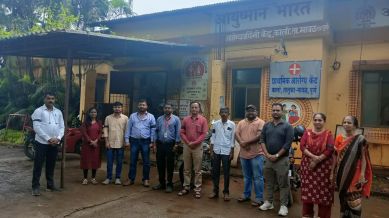Click here to join Express Pune WhatsApp channel and get a curated list of our stories
Black ribbon protest in Maharashtra medical colleges against move to register homoeopathic practitioners with certification in pharmacology
At B J Government Medical College in Pune, more than 350 resident doctors and interns participated in the silent black ribbon protest.

Resident doctors and interns across Maharashtra’s government medical colleges participated in a silent black ribbon protest Tuesday against the decision to allow homoeopathy practitioners who have completed the Certificate Course in Modern Pharmacology (CCPMP) to be registered with the Maharashtra Medical Council (MMC).
“Across various government medical colleges in the state, resident doctors wore black ribbons as a mark of protest,” said Dr Sachin Patil, president, central unit of the Maharashtra Association of Resident Doctors.
monthly limit of free stories.
with an Express account.
Dr Chaitanya Melavane, president of the Pune unit of MARD, said that more than 350 resident doctors and interns from B J Government Medical College participated in the silent protest.
Dr Akshay Dongardive, president of the Federation of All India Medical Associations (FAIMA), said they have urged the authorities to withdraw the decision to register the CCMP-registered homoeopathic practitioners with the MMC.
Dr Patil said MBBS doctors are serving in rural areas despite the inadequate facilities and lashed out against claims that they do not work in remote areas.
“Every year, close to 10,800 medical students graduate. There has been an increase in medical seats at medical colleges now in areas like Gondia, Gadchiroli, Parbhani, Hingoli and so on. This is also apart from the number of students who graduate from medical colleges affiliated with deemed universities. Hence, there is an availability of MBBS doctors to serve in far-flung, hard-to-reach pockets also,” Dr Patil added.
Meanwhile, the Maharashtra unit of the Indian Medical Association (IMA) called for a day-long strike on September 18 to oppose the state government’s decision to register Bachelor of Homeopathic Medicine and Surgery (BHMS) practitioners who have completed a one-year certificate course in modern pharmacology.
The Association of Medical Officers also raised deep concern and strongly opposed the decision.
Dr Avinash Dahiphale, secretary of the Association of Medical Officers, said the state’s move undermines the standards of modern allopathic medical practice and poses a potential threat to public health and patient safety.
Inadequate training in modern medicine
In its letter to Chief Minister Devendra Fadnavis, the Association of Medical Officers stated that the MMC is a statutory body for allopathic practitioners and was set up to regulate and maintain the ethical and professional standards of modern medicine.
“Hence, including practitioners trained primarily in alternative systems of medicine dilutes the very foundation and purpose of the Council,” the letter stated.
While the CCMP course offers basic pharmacological training, it cannot equate to the rigorous, evidence-based curriculum and clinical training of MBBS graduates, the letter said.
“This disparity in training raises serious questions about the competency of CCMP-certified BHMS doctors to independently prescribe and treat patients using allopathic methods,” it added.
Past court rulings have clearly defined the limits of medical practice, stressing that practicing outside one’s qualifications is both unethical and illegal, it said. “This move could open the door to further legal challenges and public outcry,” it added.
“The recognition of BHMS+CCMP practitioners for MMC registration will create confusion among patients, compromise trust in the medical system and may adversely affect the recruitment and morale of qualified MBBS doctors, especially in the public health system,” it said.
The doctors urged in their letter to the CM the need for upholding the integrity and sanctity of modern medical practice and to reconsider and revoke the decision to include CCMP-certified BHMS practitioners under MMC registration.
Click here to join Express Pune WhatsApp channel and get a curated list of our stories